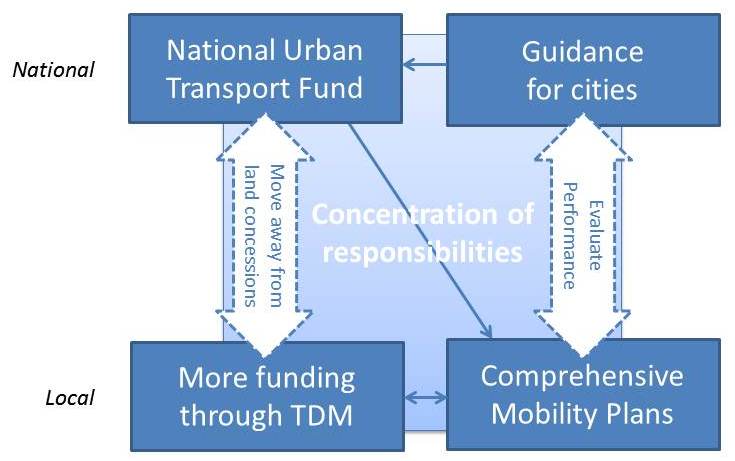Final Workshop Summary Report on Financing Sustainable Urban Transport in China
Final Workshop Summary Report on Financing Sustainable Urban Transport in China
How to finance Sustainable Urban Transport was the main question during the 3-days workshop Prospects for National-Level Programmes and Funds for Sustainable Urban Transport in China. From 1st to 3rd of November 2012 GIZ, EMBARQ and SLoCaT in cooperation with CUSTReC jointly conducted this international expert workshop.

Download the full Workshop Summary Report in English or Chinese.
Download background information on China or here for further country studies on France (EN), Germany (EN/CN), India (EN/CN), Mexico (EN/CN), the United Kingdom (EN/CN), the United States (EN/CN) and Brazil (EN/CN).
Interactive discussions showed that funding of sustainable urban transport in China needs to be addressed in a comprehensive manner. Improving the actual funding will need to go hand in hand with institutional reforms at both the national and the local level. Some big cities in China have already started implementing sustainable transport infrastructure schemes as well as sustainable transport related policies and measures. At the same time other (mostly smaller) cities still lack the capacity and financial resources to improve their sustainable transport systems and policies. Therefore, China is facing two important questions in financing urban transport:
- What can and should the national government do to establish conditions allowing a sustainable development of transportation in Chinese cities?
- How can an institutional system be developed that promotes a more sustainable development of urban transport systems and is economically sustainable at the same time , i.e. what are suitable procedures and criteria for national-level funding of urban transport (construction, maintenance and operation)?
To address these two questions the workshop aimed to gain a better understanding of current institutional and financial arrangements in China for (sustainable) urban transport and learn from international experiences. The key focus was on the development of specific recommendations for the Chinese situation and funding practice. Workshop participants identified the following three building blocks to improve financial flows into sustainable urban transport:
Combining national-local sustainable funding mechanisms. Workshop participants suggest creating a Chinese National Urban Low Carbon Transport Fund and improve local value capture.
Applying a comprehensive approach to integrated planning. Focusing currently scattered national and provincial policy guidance into a national urban transport policy and introducing performance-based funding.
Coordination of institutions within and between cities. Comprehensive mobility plans can be coordinated by setting up regional transport authorities or associations with the capacity to plan, develop, and oversee all components of the transport system.
For additional information, please see below:
EMBARQ – Evaluate, Enable, Engage: Principles to Support Effective Decision Making in Mass Transit Investment Programs
The insights of this report will be of use to administrators of national mass transit investment programs that are identifying areas for improvement, national governments that are introducing new programs, and representatives of multilateral institutions that are helping to structure such programs. Download
GIZ – Financing Sustainable Urban Transport
Urban transport has historically not received the attention, careful planning and financial support it deserves in order to function in a sustainable manner. As a step to address this issue, this new GTZ Sourcebook module provides detailed information on available options for financing urban transport. It presents different financing instruments and ways in which they can be best used, and how to optimally combine them. This module is dedicated to policy makers, financial sector specialists and urban planners/practitioners working on key challenges related to financing urban transport systems. The sourcebook provides options to close the gap between the ever growing demand for efficient, equitable and environmentally friendly urban transport systems on one hand, and the dwindling financial resources available to state and local authorities on the other hand Download in Englisch; Download in Chinese
Worldbank – China: Building Institutions for Sustainable Transport
Based on a number of background studies on the urban transport problems facing China’s large cities, this report summarizes the diagnostic analyses of these problems with a focus on the associated institutional issues, and recommends policy directions and short- to medium-term institutional development actions for sustainable urban transport. In particular, it examines the changing nature of urban transport problems in a broad context of urbanization and fiscal decentralization, and calls for the national government
to re-define and strengthen its role in dealing with the spillover effects of urban transport problems. The report is intended to contribute to the current debate on urban transport issues and to serve as a technical input to the government policy making process, especially at the national level. Download
Carnegie – National Urban Transport Policy Symposium
The National Urban Transport Policy Symposium (October 10-12, 2012) brought together international transportation experts, officials, and politicians. During the symposium shared challenges were examined, shared opportunities identified, and discussions held on potential responses through replicable models of and specific policy mechanisms in national urban transportation policy. The results of the symposium are summarized in this report. Download